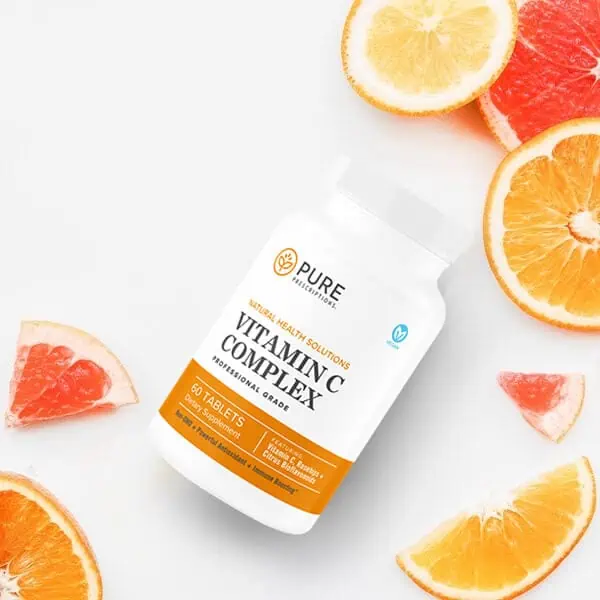Hi, I’m Dr. Chad Larson. We’re going to continue our series talking about micronutrients: Vitamins and Minerals. I believe that as pharmaceuticals become more and more the go-to tool in healthcare, there needs to be a greater and greater emphasis on understanding micronutrients so that the information doesn’t get lost. Because medications are frequently prescribed for a wide variety of health issues that are probably related to a nutrient insufficiency or deficiency. Nutrients are what the body is really needing, yet a medication is prescribed in their place. That’s unfortunate because nobody has a pharmaceutical deficiency, but they can certainly have a nutrient deficiency.
So it’s a little bit backwards. Understanding micronutrients, diet, and nutrition really should be part of the education of human health, but it’s not taught in medical schools. Therefore we need to keep the conversation around micronutrients going so that people really understand the importance of actual, real food.
Also, as supplements become increasingly sophisticated and popular, I think it’s good to educate people on the best sources of their nutrients if taken in supplement form. That’s really the goal of this series on micronutrients.
Today we’re going to talk about vitamin C
Vitamin C a very important micronutrient with the technical name ascorbic acid. We have a pretty long history of understanding vitamin C and how it works in the body. And of course as nutritional science and research evolve, we learn even more about really important nutrients such as this.
Vitamin C is an essential nutrient, and you’ll recall from past episodes that the word “essential” pertains to nutrients that we can’t live without and that our bodies don’t make. Some animals make vitamin C, but humans don’t. We have to get it from an outside source such as a supplement, or primarily from our food. So we’ll talk about food sources of vitamin C.
But first let’s talk a little bit about what ascorbic acid is. Vitamin C is a nutrient that plays a part in nearly every organ system of the body. It’s one of the very multifactorial, multi acting nutrients in the body. Most people recognize vitamin C as a nutrient associated with the immune system. It’s been known for a long time that vitamin C supports multiple aspects of both the innate and the adaptive immune system.
And it’s also an antioxidant. There’s a process that happens in the body that accelerates the aging process and disease onset, and it’s called “oxidation” or “oxidative damage.” But we have antioxidants in our system to help slow down and buffer that process. Our cells make certain types of antioxidants like glutathione, but also we need to get antioxidants like vitamin C from an outside source. These antioxidants really help to quench that oxidative stress in the system.
Think of skin damage, which is basically an oxidative process. If we’re getting sun in the wrong ways and we’re not having enough antioxidants, this can really damage the skin.
We talked before about the importance of vitamin D, and the formula you can use to make the sun a healthy source of vitamin D. But vitamin C is also really important. And as we talk about some of the food sources of vitamin C, you’ll notice that these foods are really abundant during the time of year that we need more skin protection from the sun. So nature’s pretty smart about supplying that to us. We naturally understand that these fruits and vegetables are delicious and they look appealing, so we want to eat them. And they’re loaded with vitamin C, so they provide the body with protection from oxidative damage.
-Dr Chad Larson
Many people just slather on lots of sunblock or sunscreen, which can be important in certain circumstances. But they’re not also making sure to have enough of the right internal nutrients to mitigate the effects of sun on the skin. That’s also very important.
Vitamin C is also really important for biosynthesis of certain other substances in the body, such as L-carnitine. That’s an important nutrient which has many jobs, like shuttling fat into the cells so it can be used as fuel. So oftentimes when we’re thinking about fat burning, and we’re helping people boost up their fat burning machinery, we also need to make sure they have enough L-carnitine to use the fat that gets mobilized. Vitamin C promotes L-carnitine biosynthesis for this. It’s also important for biosynthesis of catecholamines such as epinephrine, norepinephrine, also called adrenaline. Vitamin C is very important to these things.
Vitamin C is also really helpful for iron absorption. Consequently, one of the most common signs of vitamin C insufficiency is also the number one symptom of anemia: fatigue. Fatigue results from low levels of nutrients such as iron and certain B vitamins, and vitamin C helps significantly with the absorption of iron. One study suggested an up to 67% increase in absorption of iron when it’s taken with vitamin C. So vitamin C is really essential to all these important systems in the body.
It also helps to promote and recycle vitamin E, which hasn’t yet been the focus of an individual episode, but it might be. Vitamin E is one of the fat soluble vitamins, namely A, E, D and K. Vitamin E itself is an antioxidant, but vitamin C helps to regenerate and recycle vitamin E. So there’s a really cool synergistic effect between vitamin C and multiple other nutrients such as iron and vitamin E.
Vitamin C is also really important in collagen synthesis and connective tissue. The collagen connective tissues are what keep your skin healthy. Where the skin is really aged and wrinkled, there’s a loss of collagen and a loss of integrity in the connective tissue. Vitamin C is important to the matrix that the body requires to support and develop and regenerate that connective tissue.
Vitamin C Deficiency
So those are the key functions vitamin C. Now let’s kind of segue into talking about deficiency. What happens when vitamin C is not abundant enough in your body?
The classic condition associated with vitamin C deficiency is scurvy. It’s not really common any more, but there can be insufficiency signs that are like a sort of sub-threshold of low-grade symptoms of it. And scurvy has a wide array of symptoms. They include fatigue, because we know it influences energy production that iron would promote. There’s also wound healing and skin issues, bleeding gums, and easy bruising. The skin and blood vessels want healthy connective tissue. But if the connective tissue is weak, you get easy bruising, and there can be bleeding gums and gingivitis. There’s a whole variety of symptoms that vitamin C deficiency can lead to.
I think we’ve always understood scurvy to be something that afflicted eighteenth century British sailors. In fact, it was the number one cause of death in the 1700’s among British sailors. Sure, they all faced the possibility of dying in battle or on a sinking ship or something like that. But they were probably most concerned about getting scurvy. It wasn’t until a scientist named James Lind figured out that individuals who consumed plenty of citrus juice (typically lemon juice but also lime juice) were likely to avoid scurvy. They didn’t know at the time that it was vitamin C in the citrus fruits that really helped to decrease those symptoms.

But this is how British sailors came to be known as “limeys.” Citrus fruits were all referred to as limes, so the sailors who depended on them were called limeys, which I believe is considered derogatory. Regardless, they needed these citrus fruits to avoid scurvy. They would add lemon juice or lime juice to their daily ration of something called grog, which was a kind of watered down rum. This helped to keep their system free of scurvy, which was actually life threatening at that time.
These are some of the important symptoms and signs that a person can develop if they become vitamin C insufficient. And another such condition is gout. When vitamin C is deficient, a painful joint condition called gout can manifest. It’s because gout is related to uric acid, and vitamin C helps to metabolize uric acid, and helps to reduce it in the system. Those with high vitamin C levels are at a much lower risk of developing this painful joint condition.
As I’ve mentioned, vitamin C is important for skin repair and support. We know that aging skin is basically a loss of collagen in the connective tissue. So making sure that you’re getting sufficient levels of vitamin C is good from a vanity standpoint. Even if you’re not especially interested in mitigating some of these other risks, you might want to ensure you’re getting plenty of the key antioxidants like vitamin C just to support healthy looking skin.
Food Sources of Vitamin C
So what are some of the food sources? Citrus is the most obvious; we talked about that. Everybody identifies vitamin C with citrus. Vitamin C is also really high in kiwi fruit and relatively high in bell peppers and other kinds of peppers. Lots of fruits and vegetables like papaya and broccoli are loaded with vitamin C. You really want to eat a broad variety of fruits and vegetables so that you have good sources of vitamin C.
From a supplement standpoint, you’ll find three different main sources of vitamin C. When it’s used as a preservative, it’s called ascorbyl palmitate, which is a preservative by virtue of its antioxidant effect. You’ll also see it as ascorbic acid, which is kind of the classic vitamin C. A few decades after it was discovered that it was vitamin C in the limes and lemons that was keeping British soldiers alive, it was finally synthesized as ascorbic acid.
Can You Take Too Much Vitamin C?
Some people who try a high-level intake of ascorbic acid find that it can upset their digestive tract. For this reason vitamin C is available in buffered form, which is the form I usually prescribe. You never know who’s going to have an adverse reaction to it, so I prescribe it in buffered form which is a lot more comfortable on the GI tract.
As far as toxicity symptoms, they’re pretty rare. Vitamin C is a water soluble nutrient, so we’re not too concerned about getting toxicity levels. If you take just the normal prescribed amounts of vitamin C, you should be good to go. If you really take too much, you could get diarrhea. So, yeah, you can kind of take it to bowel tolerance, which for some people is just a few hundred mg per day. But it doesn’t take much vitamin C to be enough. You just want to get it consistently.
It’s actually very difficult to take too much vitamin C. The body is going to balance it out. It’s water soluble so you’ll just excrete the excess, although some people will get digestive upset or diarrhea.
Vitamin C. Very key nutrient. I hope maybe you learned something about it. I will keep reading the studies and bringing you the information. Until then, keep it real.







